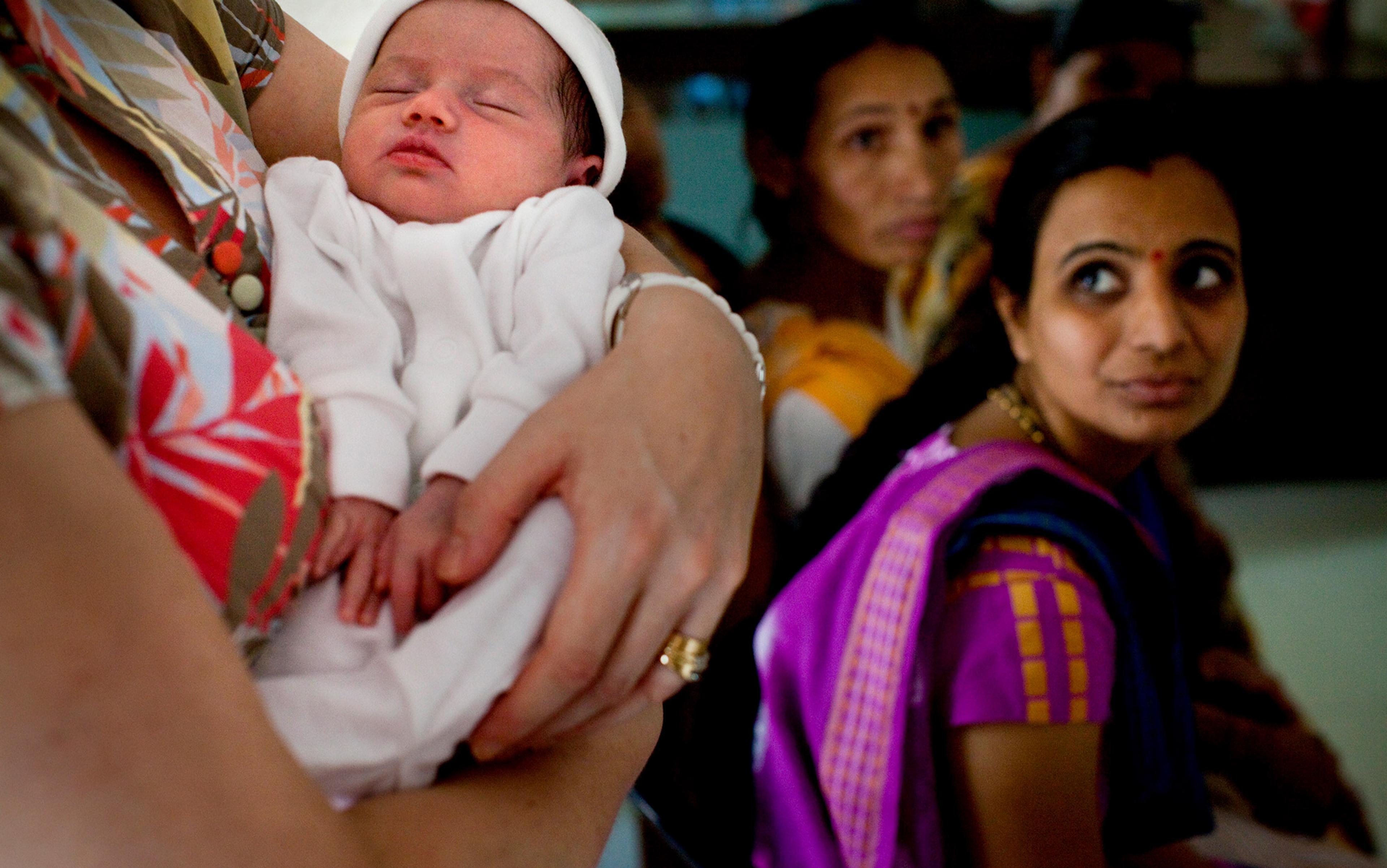Imagine that a 14-year-old girl, Kate, decides that she wants to become pregnant. Kate’s parents are generally broadminded, and are supportive of her long-term relationship with a boy of the same age. They are aware that Kate is sexually active, like 5 per cent of 14-year-old girls in the United States and 9 per cent in the United Kingdom. They have provided her with access to birth control and advice about using it. However, they are horrified by their daughter’s decision to have a child, and they try to persuade her to change her mind. Nevertheless, Kate decides not to use birth control; she becomes pregnant, and gives birth to her child, Annabel.
Many people might think that Kate’s choice was morally wrong. Setting aside views about teenage sexual behaviour, they might argue that this was a bad decision for Kate – it will limit her access to education and employment. But let’s imagine that Kate wasn’t academically inclined, and was going to drop out of school anyway. Beyond those concerns, people might worry about the child Annabel. Surely Kate should have waited until she was older, to give her child a better start to life? Hasn’t she harmed her child by becoming pregnant now?
This issue is more complicated than it first seems. If Kate had delayed her pregnancy until, say, age 20, her child would have been conceived from a different egg and sperm. Because of this, Kate would have a genetically different child, and Annabel would not have existed.
Kate could defend her actions: ‘I haven’t harmed my child. If I hadn’t conceived when I did, Annabel would never have been born.’ With this in mind, it might seem that Kate did not harm Annabel. After all, Annabel couldn’t blame her mother for having her so early: as long as Annabel has a life that she judges worth living, she should be grateful to her mother for becoming pregnant at age 14. Though many might still have the feeling that Kate did wrong by her child, it is hard to pinpoint a reason why the girl’s choice was wrong.
The puzzle of how to think about such cases is called ‘the non-identity problem’. The late philosopher Derek Parfit of the University of Oxford described and explored this problem in his influential book Reasons and Persons (1984). The ethical issue at the heart of the non-identity problem is about the reasons behind our actions. If doing something will harm someone – if it will make them worse off than they would otherwise have been – then we clearly have a reason not to do it. Parfit called these kinds of reasons ‘person-affecting’ – they affect specific people for better or for worse. Most of our morality and our laws centre around just these sorts of person-affecting reasons.
However, the non-identity problem arises when we face decisions that change which people will exist. In those cases, person-affecting reasons do not help us. In our case with the 14-year-old Kate, delaying her pregnancy would change who would exist in the future. It wouldn’t benefit any particular child; there is no person-affecting reason for Kate to delay her pregnancy.
In such cases as Kate’s, perhaps there is a different type of moral reason that could apply. Parfit suggested that actions can be morally worse impersonally if they cause people to exist who have worse lives than other people who could have existed. On this basis, Kate’s decision might be impersonally wrong, because the child who is born now has worse prospects than the child who could have been born later.
This example might seem far-fetched, but Parfit pointed out the very significant implications of the non-identity problem for energy policy and the environment. He imagined two policies about the use of resources. One policy, which he called ‘Depletion’, would lead to the unchecked use and eventual depletion of our natural resources. In the short term, people would be generally better off, but in several generations’ time it would lead to people on Earth living much lower-quality lives. The alternative policy, ‘Conservation’, would conserve natural resources. In the short term, people’s quality of life would not be as good, but in the long term, overall, it would be much better. However, Parfit pointed out that these different policies would affect the timing of conception and the identity of people in several generations’ time, since they would potentially have a major impact on the whole of society and the way in which people lived their lives. The people who live in a future ‘depleted’ world would be completely different from the population who would live in the ‘conserved’ world.
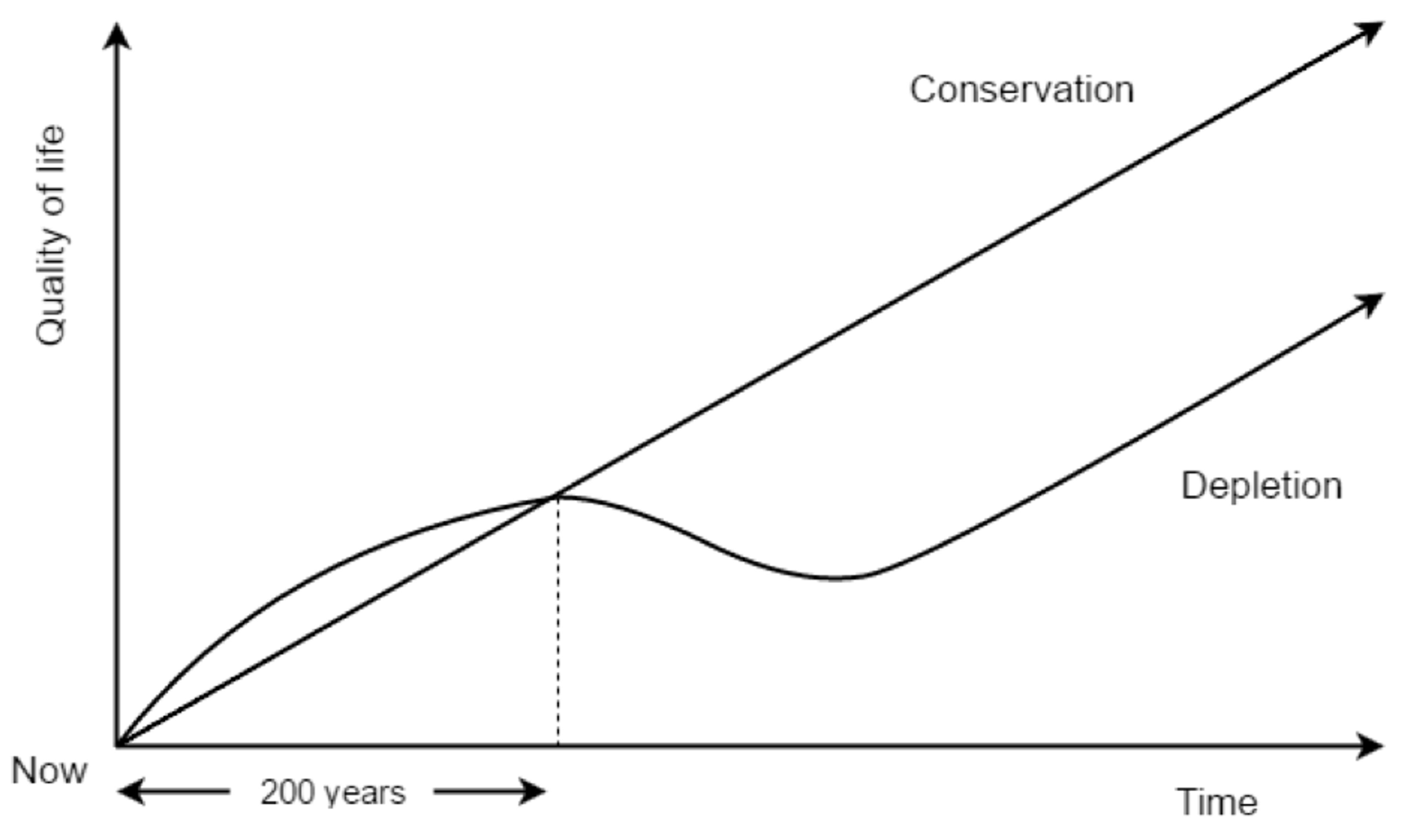
Figure 1: Comparing the two policies, Conservation and Depletion, in Parfit’s application of the non-identity problem to the use of natural resources
Parfit’s point that the world populations under the two policies will eventually be completely different seems reasonable. But many would still believe that choosing Depletion is wrong. Person-affecting reasons can’t explain this intuition; the policies won’t be better or worse for specific people. Our response to such cases suggests that we should also be concerned about impersonal reasons, reasons that don’t relate to specific, identifiable people.
This suggests a two-tiered approach to ethics. When we think about things that we do now that will affect those around us, we can use our traditional and familiar person-affecting morality: it is bad to harm someone else, and it is good to benefit them. But when we think about things that will affect people in the far future, we might need to draw on impersonal morality: it would be good if future people have happy lives, and it would be bad if they have miserable lives.
However, here is a further challenge: there are some special circumstances where we could either benefit specific people or we could affect which future people exist. Is one of these morally more important than the other? How should we weigh up person-affecting and impersonal reasons?
The recent outbreak of the Zika virus provides a real-life example of this special non-identity dilemma.
In the early part of 2015, researchers in Brazil observed an outbreak of the previously little-known Zika virus, carried by Aedes mosquitoes. The disease itself was fairly mild, but it coincided with a striking increase in reports of babies born with very small heads (‘microcephaly’) and severe brain abnormalities. Brazil announced a national public-health emergency on 11 November 2015, while the World Health Organization declared Zika a ‘Public Health Emergency of International Concern’ in February 2016.
We now know that Zika causes damage to the foetus’ developing brain if a mother is in the early stages of pregnancy when she contracts the infection. This leads to a condition called Congenital Zika Syndrome characterised by intellectual disability and microcephaly.
There are relatively few options available for preventing Congenital Zika Syndrome. One is to target the mosquitoes that spread the virus by using insecticide, removing breeding grounds, or providing people with mosquito repellent or nets. But another option is less familiar: to encourage birth control.
Policymakers realised that it would reduce the risk of congenital Zika if women delayed becoming pregnant, either until the peak mosquito season had passed or until more was known about the virus. A number of countries advised women of reproductive age to delay pregnancy, including Colombia, Ecuador, Jamaica and Brazil. The government of El Salvador recommended that women delay pregnancy for two years. This sort of official advice to a population to stop reproducing is striking, and virtually unprecedented. It is a sign of just how serious the threat of Zika appeared.
Birth control raises the non-identity problem, since it changes who will exist in the future
There are various ethical concerns that people might have about contraception. Religious objections are probably the most familiar, and providing contraception can be politically controversial. The US Zika funding bill allocated $1.1 billion to medical research and mosquito control, but none of that funding was permitted to be used for birth control.
However, if we set aside those sorts of concerns, there is still one way in which birth control is different from most other ways of avoiding congenital Zika. As the discussion above makes clear, birth control raises the non-identity problem, since it changes who will exist in the future.
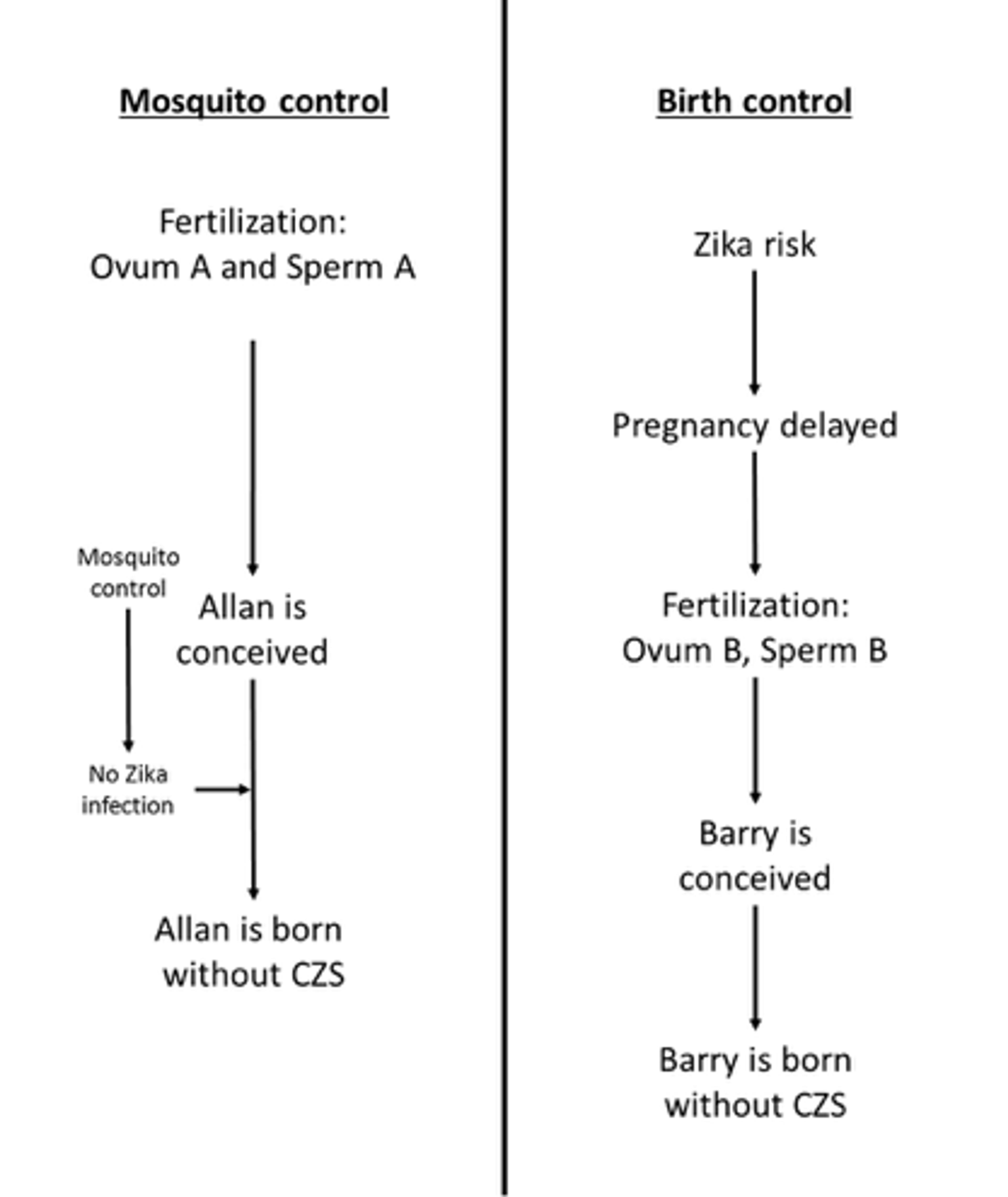
Figure 2: The identity implications of different interventions for Zika. Mosquito control offers a person-affecting benefit, while the benefit of contraception is impersonal
When we are thinking about different possible ways to tackle a public-health problem such as Zika, what role should we give to birth control? Does the non-identity problem mean that there is an ethical difference between this and other ways of avoiding Congenital Zika Syndrome?
There are different ways that philosophers have responded to these questions. One possibility is to deny that impersonal reasons are morally significant. As the philosopher Jan Narveson argued in ‘Utilitarianism and New Generations’ (1967), ‘we are in favour of making people happy, but neutral about making happy people’. On that view (which we could call a ‘person-affecting view’), morality is only concerned with actions that will be better or worse for specific people. If the person-affecting view were correct, US policymakers would be justified in funding mosquito control but not birth control to tackle Zika.
Other philosophers take the opposite approach. Parfit, for example, felt that impersonal reasons were just as important as person-affecting ones. For Parfit, and for many other philosophers, there seems to be no difference between preventing congenital Zika in particular babies, and changing which babies exist so that they don’t have congenital Zika. The important thing is to avoid disability in newborns, and it doesn’t matter which way we do that.
In between these two views is a third possibility: perhaps impersonal reasons are less important than person-affecting ones, though they still count for something. On that view, if birth control and mosquito control were going to prevent the same number of cases of microcephaly, we should choose mosquito control. But if contraception were more effective – if it were going to avoid enough extra cases of congenital Zika – then we might decide to fund that instead of mosquito control.
If philosophers are divided about how to evaluate the non-identity problem, what about the wider community? Interestingly, to our knowledge there is no published research on what non-philosophers think about the non-identity problem, or on how they would respond to hypothetical case scenarios such as the ones described above. Earlier this year, we asked Aeon readers for their views about a series of cases similar to the ones described above, including the cases of depletion and congenital Zika. What did we find?
More than 750 readers completed the survey. One relatively clear finding was about the moral significance of impersonal reasons. Faced with a choice between a policy of depleting or conserving a natural resource, three-quarters of respondents felt that it would be wrong to adopt a policy of depletion. This is despite us pointing out that the future people living in a depleted world would be different from the people who would live in the conserved world. It appeared that most of our respondents didn’t accept the ‘person-affecting view’.
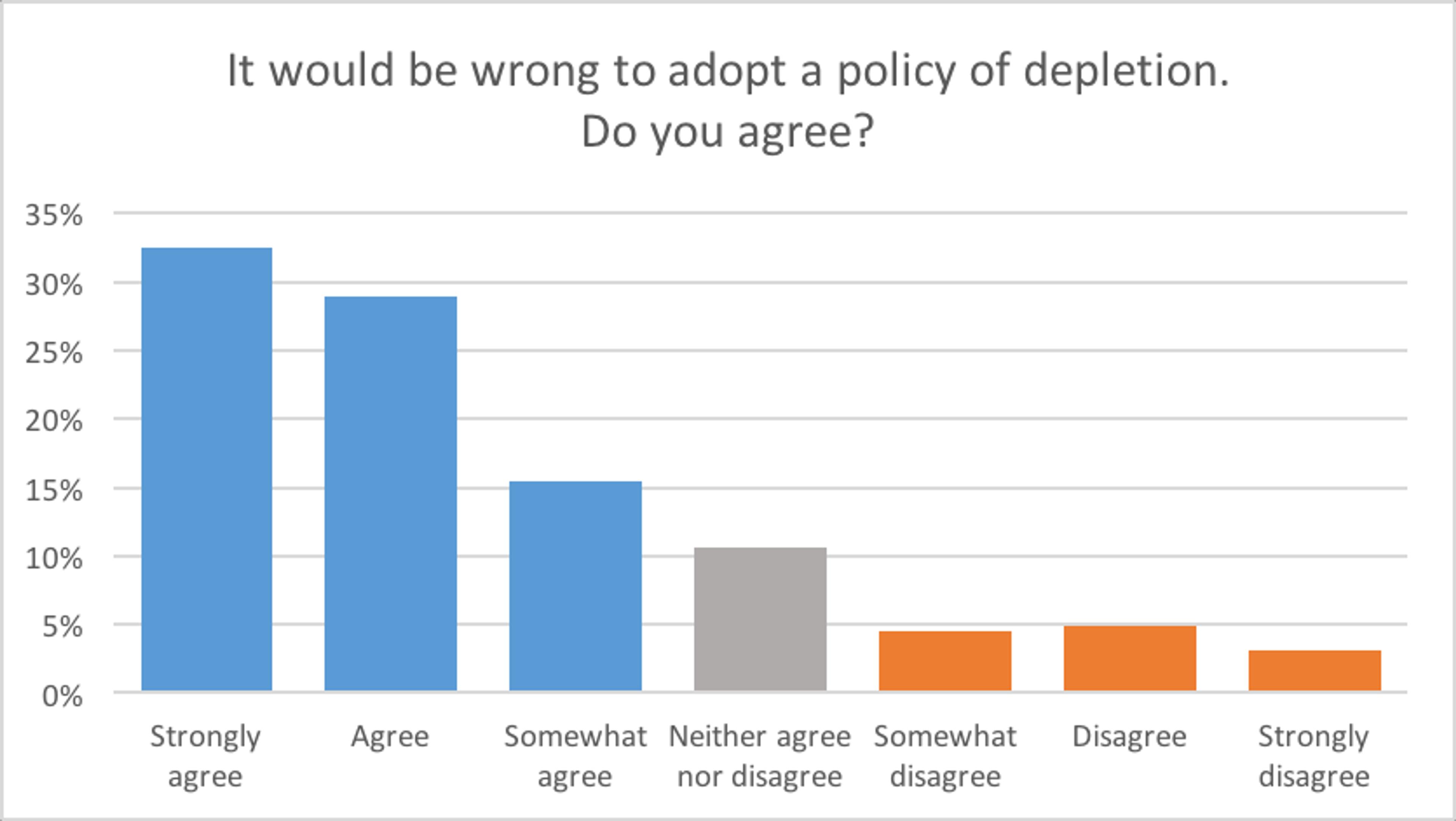
Figure 3: Responses to policy of depletion from Aeon survey
However, relatively few of those who answered the survey seemed to accept Parfit’s ‘no-difference view’ either. We asked readers whether they would choose to fund mosquito control or birth control if they would avoid the same number of cases of Congenital Zika Syndrome. Only 19 per cent had no preference, which is what the no-difference view would imply. Just over half preferred the person-affecting option of mosquito control, while 36 per cent preferred to fund contraception. In some cases, these preferences were very strong – 10 per cent answered that they would never fund mosquito control, and 15 per cent said they would never fund contraception, regardless of their effectiveness. For others, their preference was sensitive to the numbers of cases. A quarter of those we surveyed would change their preference and fund the opposite intervention if it would avoid even one more case of congenital Zika.
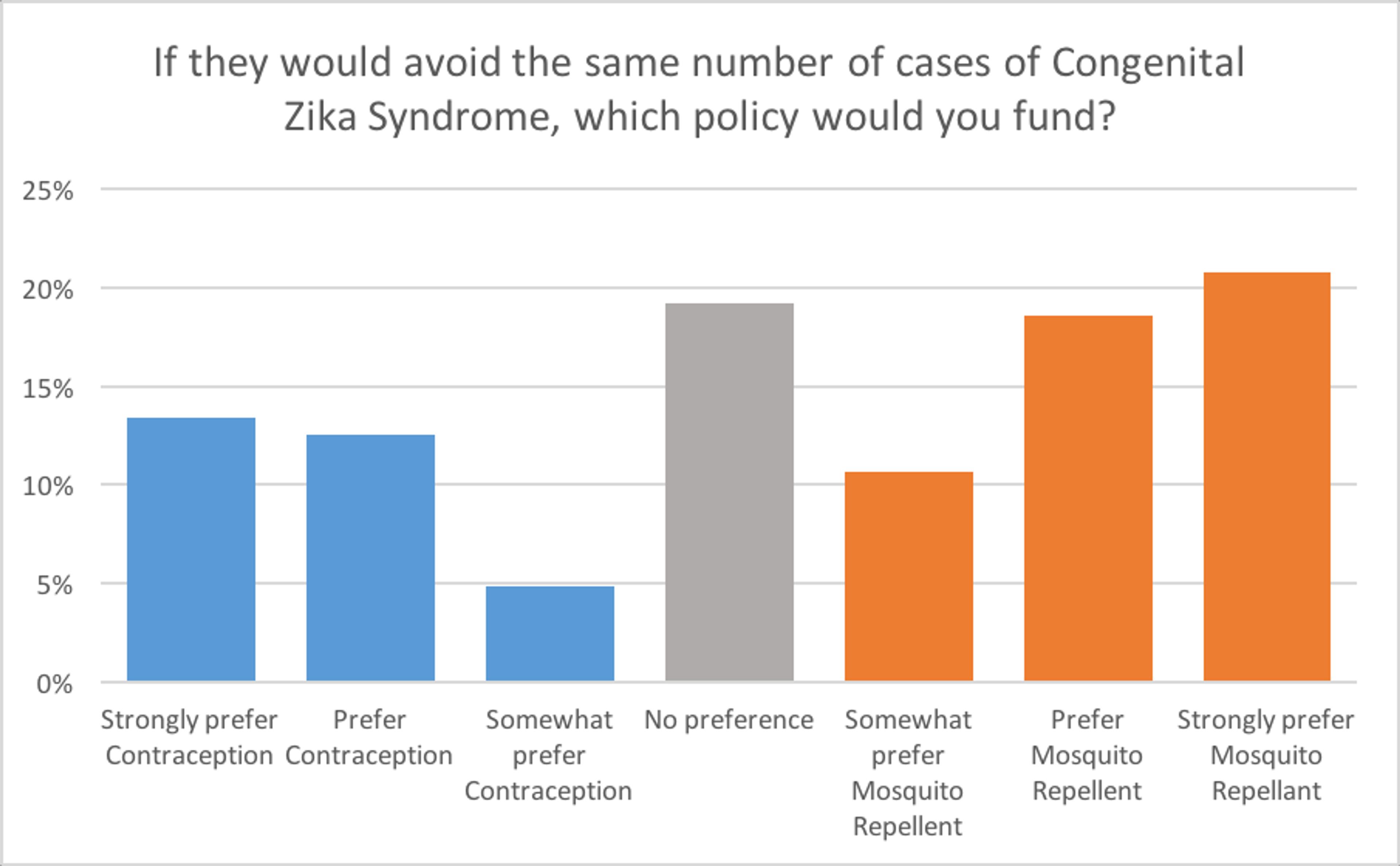
Figure 4: Responses to birth control vs mosquito control from Aeon survey
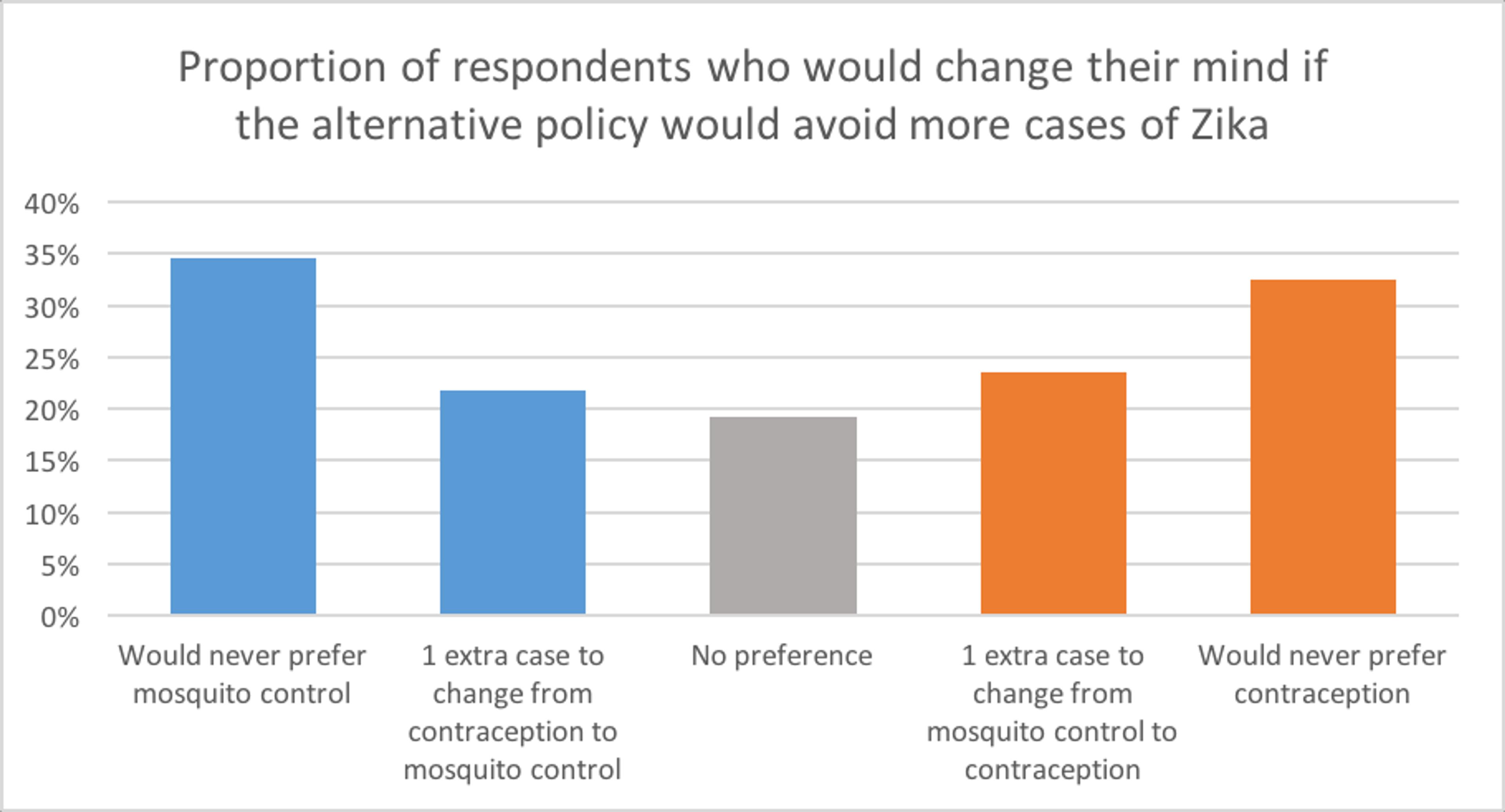
Figure 5: Responses to change-of-mind scenario from Aeon survey
Interestingly, the non-identity problem itself didn’t seem to be a big factor in the responses. When we pointed out the non-identity problem, few people changed their choice. Moreover, of those who gave reasons for their answers, only one in 10 mentioned the non-identity problem or something like it in their response. Instead, many readers said they were motivated by the importance of reproductive freedom, or because it was wrong to impose birth control as a public-health strategy.
One wider issue raised by the non-identity problem is about the role of intuitions in ethics. When philosophers have considered the non-identity problem, they have described how they personally respond to hypothetical cases. However, as our survey makes clear, while non-philosophers sometimes reach the same conclusions, at other times they have quite different views. If philosophical analysis reaches a different verdict from widespread ‘gut’ responses, which one should we believe? One school of thought in philosophy, ‘intuitionism’, sees moral truths as self-evident – we can discover them by reflecting on a problem and seeing what feels right or wrong.
However, other philosophers argue that gut feelings are unreliable, and that we should base our moral conclusions on careful analysis and argument. An influential compromise was suggested by the political philosopher John Rawls. He proposed that we should compare and combine our intuitive responses with theory and argument in a process called ‘reflective equilibrium’. The idea is to look at where our intuitions and theory come together, and where they differ. When they pull in different directions, we should re-examine both our intuitions (perhaps they are biased, or represent a misunderstanding) and our theory (perhaps the theory is mistaken). This back-and-forth process might lead us to revise our initial feelings about a problem, as well as to revise our arguments and moral theories.
Can we reach any sort of reflective equilibrium about the non-identity problem and potential responses to the Zika epidemic? One area where intuitions and arguments converge is about the importance of ‘impersonal’ reasons. It does matter morally if we make decisions that will lead people in the future to live much worse lives. The view that only person-affecting reasons count is mistaken. Therefore, we shouldn’t rule out contraception as an ethical option for avoiding cases of congenital Zika.
But it is less clear how much weight we should give to these different types of reasons. Are impersonal reasons just as important as person-affecting ones? Both philosophers and non-philosophers seem divided on that point.
The extra time taken to wear insect repellent would change the genetics of future people
Further reflection about the theory and argument might help us. We have described the decision about mosquito control or birth control as a trade-off between impersonal and person-affecting considerations. But the real situation is more complex. Contraception itself has other, person-affecting benefits beyond the interests of newborns. For one, it would prevent the very substantial burdens placed on families where an infant has microcephaly. Moreover, contraception has other benefits for women – it can reduce infant and maternal mortality, help to prevent sexually transmitted infections, reduce population growth, and enhance women’s access to education. (Mosquito control could also have other benefits, of course, by reducing the spread of other infections; it might also have negative ecological side-effects, a concern that might have affected some people’s choices in the survey.)
There is another complication: we pointed out that contraception leads to different children being born, because delaying conception for more than a month will lead to a different egg being fertilised. But smaller changes in the timing of conception might change which of the hundreds of millions of possible sperm ends up fertilising the egg. That could mean that the extra time taken to wear insect repellent, or to take a different road home to avoid an area with heavy insecticide spraying, would change the genetics of future people. So mosquito control could change the identity of some (though of course not all) of the babies born shortly thereafter. If this is the case, then a public-health campaign of mosquito control would also have a mix of impersonal and person-affecting benefits.
What does that mean for the practical question of which interventions to use to avoid Congenital Zika Syndrome? Since there is no way to work out how much of the benefits of mosquito control or birth control are impersonal versus person-affecting, and since there is no agreement on how to weigh up the moral significance of these two different reasons, we propose that we should consider both of these potentially valuable alternatives. If either intervention is significantly more cost-effective or practical, we should fund that one. There is some evidence that using contraception to avoid congenital Zika would pay for itself several times over, though there is no such evidence about mosquito control to compare against. Given this uncertainty about benefits, it would be prudent to allocate funding to a range of different strategies including mosquito control and birth control (as well as to vaccine and drug research).
Finally, what does this mean for philosophy and practical ethics? The non-identity problem shouldn’t influence our choice of strategies for addressing Congenital Zika Syndrome. That is because of the complex and indeterminable mix of effects of our actions. That might be the case too for some other political decisions that we make, but it doesn’t mean that the non-identity problem isn’t important. As we contemplate some of the greatest ethical challenges that lie ahead in the 21st century – climate change, population policy, genetic engineering – the non-identity problem will continue to rear its head. What matters most ethically? How should we weigh harms and benefits to current and future people? What are our ethical obligations to people who might or might not exist? Those fundamental and formidable questions remain.
What is your view on the non-identity problem? Take the quiz.



